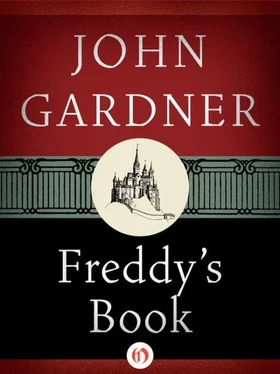Kristian had been fooled for the last time. With his family, dressed in the humblest peasant garb, he fled that night to the Netherlands.
9.
DENMARK WAS NOW in great confusion, struggling with government by a foreigner. The multimillionaire merchants of Lübeck met in secret, smiling and nodding their round, plump heads, the Devil inconspicuously seated in their midst. To Fredrik, they would promise their full and unstinting support, they agreed, beaming happily. To Gustav Vasa they would promise the same. Let the stronger dog kill the weaker, or let each dog rule his own yard, growling at the other.
Bishop Brask, when he received the secret messenger from Lübeck, smiled bitterly, showing his long yellow teeth. He went for a walk to get himself in hand, then sent the same messenger to bring him Gustav.
“My friend,” he said to Vasa when he arrived, accompanied by Lars-Goren, “it seems you’ve been made king by the Germans.” He stood grimly smiling, letting the words sink in. When Gustav showed nothing, as if the news were already old and dull to him, the bishop continued, “It’s a curious turn of events, as you must know. You’re not the person we’d have chosen, if we’d had any say in things. By ‘we’ I mean—” He turned away toward the great dark arch of the fireplace, as if embarrassed. The room they met in was comparatively small and gloomy, a mere closet if set against the great halls of Paris or Vienna. They were alone, the three of them, except for a round-backed old monk in the corner, reading a book and muttering to himself in Latin. Gustav Vasa sat on a small wooden bench, his hat over his knees, his gloved hand lying on his swordhilt. He seemed much changed by his experience as head of the rebellion. He’d hardened everywhere — every muscle turned to cable, his skin dark as leather and so tough it seemed unlikely that even a dagger could puncture it — but hardened especially around the forehead and eyes. His expression was like that of a man listening for something, listening so intently that he had nothing left over for what was happening around him, not even the strength or interest to raise an eyebrow. His eyes were serene but as hard as blue steel. He was slightly drunk, just noticeably sullen. They’d stopped at an inn on their way to their meeting with the bishop.
Bishop Brask had changed too, but in a different way. He looked older by fifteen years than he’d looked that day in Dalarna when Lars-Goren had met him, or so it seemed to Lars-Goren.
The bishop cleared his throat and continued, looking out at the night, “King Fredrik has hinted that he may release Kristina Gyllenstierna, Sten Sture’s widow.” He glanced at Gustav Vasa as if to see if he’d heard the news already. Gustav showed nothing. The bishop frowned. “Fredrik knows her claims better than yours — not to put too fine a point on it. No doubt it’s occurred to him that her presence in Sweden would rouse supporters.”
Just perceptibly, Gustav nodded.
“You, of course, would be one of the first,” Bishop Brask continued. “You’re a reasonable man, a just man. You’d hardly deny that her claim is superior to your own.”
Gustav said nothing.
The bishop stretched his neck, adjusting the sagging flesh to the high, tight collar. “Your stance, of course, would have a good deal of influence. You’re a national hero.” Again Brask threw a look at Gustav, then quickly looked away. He interlaced his fingers in a gesture curiously meek and pious, then turned once more to the window. “However,” he said, “what’s right and just is apparently not the point — as usual. The Germans prefer you to Kristina. You’ve made certain agreements with them. The point is simply this.” He sighed heavily and for an instant seemed to lose his thread. Abruptly, he continued, “It would please King Fredrik no end to see us tear ourselves apart in civil war. The Germans wouldn’t like that, of course. Who would, except Fredrik? We can’t move an inch without the Germans. We all know that. And the terrible truth is, even with the noblest intentions in the world — not that I accuse you of any such thing—” He smiled to himself. “Even with the noblest intentions in the world, you might be pushed, one way or another, into pressing your claim. These things happen. Someone might persuade you that you’re the better choice, might stir up your powerful patriotic feelings; or you might perhaps, on some sudden impulse …” Slowly, he turned back to Gustav. “The point, as I was saying is: I’m not in a position to back losers, even if I like them. So you win, it seems.” He smiled again. “It’s an interesting life.” He could hardly have spoken with more weariness and despair if he were saying, “All the world is a grave.”
Gustav Vasa was frowning with that farmerish look he was fond of putting on with those who thought of themselves as his superiors. Lars-Goren, standing at the door, stared hard at a tile halfway between the bishop and himself. His kinsman Gustav sat in the periphery of his vision, yet Lars-Goren saw his expression clearly. It was, if one saw past the peasant mask, the look of a guard-dog, a look so ferociously focused on one thing that it might have been mistaken for madness.
“I don’t ask to be king,” he said. “I don’t want anything to do with your plots and schemes.”
“Of course you don’t!” said Bishop Brask, quickly and reassuringly. He gave a weary little wave. But Gustav was in no mood to be patronized. He stood up, clenching both fists. “My dear bishop,” he said, barely controlling himself, “for all your vast experience and learning, you don’t know anything. I fight your wars, I pull in the help of the Germans, I out-fox von Melen himself and bring him over, and you want some fine lady to be ruler of the Swedes. Have her! Good for you! Just don’t waste my time bringing me to hear your reasons!”
Bishop Brask sadly shook his head and rubbed his hands together. “Come, come,” he said, a kind of whine in his voice “you’re too hard on me! It’s quite true that you wouldn’t be my first choice as king, but you are my choice. Why be difficult? I’ll tell you what it is that I mind most about seeing you chosen. Shall I?” He looked over at Lars-Goren as if asking for his permission too. “What I mind most — on your account as much as mine — is that it will change you from an animal to a man.”
“The day that happens, the Devil will convert to Christianity,” said Gustav.
Abruptly, loudly, the monk in the corner of the room began to laugh. They all knew the voice; it was the Devil. Lars-Goren felt a weakness coming over him.
“I’ve gone about this very badly,” said Bishop Brask, wincing and looking hard at Gustav. His voice, to Lars-Goren’s surprise, became a pitiful old man’s. “I’ve been a good ally to you, Gustav, surely you’ll agree. I’d hoped that if I spoke with you frankly, laid my cards on the table — no tricks, no cunning manipulation — we might become friends.”
“We’ll see,” said Gustav.
“Yes, we’ll see, of course.”
As Gustav moved toward the door, the bishop caught his arm and leaned close, timid and confidential. “Make no mistake, your troubles are just beginning!” he said. “You’ll need every friend you can get! Surround yourself with men who have proved you can trust them! Remember your own!”
Gustav seemed to think about it. “I’ll do that,” he said. “Goodnight.”
“Good-night,” said the bishop, his fragile old fingers snatching at Gustav’s hand to shake it. As Lars-Goren followed, the bishop caught his hand too and shook it heartily. “Good-night, my friend,” he said to Lars-Goren, eagerly fixing him with his eyes. “Good-night and God bless you!” As they walked down the stairs he called from the landing, “Well, good-night then!”
Читать дальше











